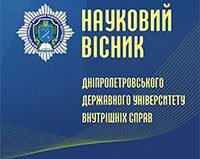Dmytro KORNILOV
KORNILOV D. (2023), MOBBING AS A NEGATIVE PHENOMENON IN THE FIELD OF WORK AND WAYS OF OVERCOMING IT THROUGH THE COLLECTIVE REGULATION OF LABOR RELATIONS; Scientific Bulletin of Dnipropetrovsk State University of Internal Affairs, № 1, 425-431
DOI: 10.31733/2078-3566-2023-1-425-431
ABSTRACT. The article analyses the current legislation to determine the relevance of the problem and countermeasures against such a negative phenomenon as mobbing in labor relations, the forms of its manifestation, the motivation of mobbers (initiators of mobbing) to commit illegal actions, the responsibility for mobbing and countermeasures at the local level. Attention is drawn to the fact that the main pillar of the state in combating mobbing is the employer. It has been established that in the fight against mobbing, the greatest attention should be paid to the preventive solution of the problem and to the timely and rapid reaction to the actions of employees who show signs of mobbing. To solve such problems, it is recommended to develop and implement appropriate mechanisms and algorithms of employees’ actions through collective bargaining. It is noted that the parties to the collective agreement are interested in solving problems related to mobbing, therefore the implementation of specific provisions in the collective agreement requires prior agreement between the parties.
Taking into account the current legislation, it is proposed to implement the «three Ps» system in the collective agreement, which consists of such elements as prevention, control and punishment. The first step to a comprehensive fight against mobbing in labor relations is the implementation of measures aimed at diagnosing of development of such a negative phenomenon among employees and researching the awareness of mobbing. Prevention should include systematic educational activities for employees. To verify the complaints of employees about mobbing, it is necessary to create a temporary commission to consider such complaints. Punishment should be aimed at restoring the violated rights of the employee. Punishment, as a violation of labor discipline, can be a reprimand or dismissal.
Keywords: mobbing, mobber, countering mobbing, a victim of mobbing, labor collective, collective agreement, responsibility.
- References:
- Yevropeyska sotsialna khartiya (perehlyanuta). Rada Yevropy; Khartiya, Mizhnarodnyi dokument vid 03.05.1996 [European Social Charter (revised). Council of Europe; Charter, International document dated 05.03.1996]. URL : https://zakon.rada.gov.ua/laws/show/994_062#Text. [in Ukr.].
- Pro vnesennia zmin do deiakykh zakonodavchykh aktiv Ukrainy shchodo zapobihannia ta protydii mobinhu (tskuvanniu) [On amendments to some legislative acts of Ukraine regarding the prevention and counteraction of mobbing (harassment)] : Zakon Ukrainy vid 16.11.2022. URL : https://zakon.rada.gov.ua/laws/show/2759-20#Text. [in Ukr.].
- Kodeks zakoniv pro pratsiu Ukrainy [Labor Code of Ukraine] : Zakon Ukrainy vid 10.12.1971. URL : https://zakon.rada.gov.ua/laws/show/322-08#Text. [in Ukr.].
- Shupta, I. M., Serdiuk, O. I. (2011) Mobinh yak destruktyvne yavyshche v kreatyvnomu kolektyvi, shcho halmuie innovatsiinyi rozvytok pidpryiemstva [Mobbing as a destructive phenomenon in the creative team, which inhibits the innovative development of the enterprise]. Naukovi pratsi Poltavskoyi derzhavnoyi ahrarnoyi akademiyi. № 3 (4), pp. 293–299. [in Ukr.].
- Fedynets, N. I. (2022) Suchasni napriamy rozvytku ekonomiky, pidpryiemnytstva, tekhnolohii ta yikh pravovoho zabezpechennia [Modern trends in the development of the economy, entrepreneurship, technologies and their legal support] : materialy Mizhnarodnoi naukovo-praktychnoi konferentsii. Lviv : Vyd-vo Lviv. torh.-ekon. universytetu, pp. 302–304. [in Ukr.].
- Hirniak, K. M. (2016) Vplyv mobinhu na formuvannia systemy upravlinnia personalom [The influence of mobbing on the formation of the personnel management system]. Naukovyi visnyk Lvivskoho natsionalnoho universytetu veterynarnoi medytsyny ta biotekhnolohii imeni S. Z. Gzhytskoho. Seriia : Kharchovi tekhnolohii. № 1 (4), pp. 167–174. [in Ukr.].
- Korablyova, O. O. (2011) Prychyny vynyknennia mobinhu yak sotsialno-pedahohichnoi problemy shkoliariv pidlitkovoho viku [The causes of mobbing as a socio-pedagogical problem of adolescent schoolchildren]. Zbirnyk naukovykh prats Khmelnytskoho instytutu sotsialnykh tekhnolohii Universytetu “Ukrayina”, № 4, pp. 66–69. [in Ukr.].
- Kodeks Ukrainy pro administratyvni pravoporushennia vid 07.12.1984 № 8073-X [Code of Ukraine on Administrative Offenses dated 07.12.1984]. URL : https://zakon.rada.gov.ua/laws/show/80731-10#Text. [in Ukr.].
- Pro kolektyvni dohovory i uhody [About collective agreements and agreements] : Zakon Ukrainy vid 01.07.1993. URL : https://zakon.rada.gov.ua/laws/show/3356-12#Text. [in Ukr.].
- Kachmar, O. V. (2016) Mobinh yak riznovyd psykholohichnoho nasylstva v trudovomu kolektyvi. Aktualni problemy filosofii ta sotsiolohii [Mobbing as a type of psychological violence in the workforce]. Issue 14, pp. 58–61. [in Ukr.].
